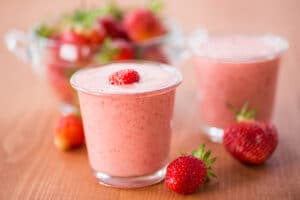Nutrition Shakes and Malnourished Seniors
Advertised on TV and in magazines, protein shakes—Boost, Ensure, and their many competitors– occupy prime shelf space in most drug and grocery store chains. These sweet, frothy mixtures, originally sold in powdered form but now packaged in six-to-eight- ounce plastic containers, promise to supply vitamins, minerals, protein, and calories to the elderly, those recovering from ill health, and body builders. Do nutritional drinks work? Should physicians, elder care providers, and the families of older adults recommend these beverages to their calorie-deprived loved ones? The answer is a qualified, don’t-overdo-it, yes.
Despite our societal focus on obesity, many older adults struggle to maintain a healthy weight. A 2014 study in the American Journal of Clinical Nutrition established that sarcopenia, malnutrition and decreasing body mass, is a chief cause of frailty, immobility, and death in the elderly. Geriatric physicians and elder care providers view unplanned weight loss as a serious health risk. Family members should too, especially if their efforts to interest their aging parents in eating anything – ice cream, cheeseburgers, mashed potatoes—have been unsuccessful.
Are Nutrition Supplement Drinks the Answer?

Elder Care Drexel Hill, PA: Protein Shakes
Frustrated in their attempts at enticing seniors to slide a spoonful of mac and cheese into their mouth, family members may be tempted to solve their senior’s nutritional problems by substituting elder care protein shakes for meals. Not so fast, the experts warn. First, those who urge seniors to consume foods and were once their favorites should recognize that the palate changes with age. The taste bud count drops after age 50, and the sense of smell (a key component of taste) often diminishes, a process further accelerated by smoking or drinking alcohol. Providers of elder care may wish to consult the senior’s physician for help in identifying underlying causes of an older adult’s waning appetite. Ulcers, thyroid problems, depression, dementia, ill-fitting dentures, and difficulty with swallowing may contribute to an older person’s refusal to eat.
Use Protein Drinks to Supplement Senior Nutrition
What role can protein shakes play in keeping a senior well nourished? McMaster University in Canada recently conducted research into the role nutritional shakes can play in reducing malnutrition among the elderly. The Canadians did not test over-the-counter products such as Boost or Ensure because commercially produced beverages sometimes contain high amounts of vitamins and minerals that can interact with a older person’s prescription medications. Instead, the researchers developed their own concoction of whey– the protein-rich milk byproduct of Little Miss Muffet fame—plus vitamin D, calcium, creatine (a substance extracted from muscle cells, often used by body builders), and oil from fish, seeds, and nuts, plus vanilla or chocolate flavorings and sweeteners.
The McMaster University study concluded that nutritional beverages containing whey protein, especially homemade shakes but even the store-bought varieties, can serve as a partial solution to a sluggish appetite and reduced muscle mass among the elderly, including those recovering from a serious illness or hospital stay. Underweight seniors who combined their protein shakes with exercise gained even more lean muscle mass than those who relied on the drinks alone. Older adults and their caregivers may want to follow the advice of body builders and add whey protein to their diets.
If you or an aging loved one are considering a Elder Care in Drexel Hill, PA please contact the caring staff at True Direct Home Health Care today.
https://journals.plos.org/plosone/article?id=10.1371/journal.pone.0181387
- How Home Health Providers Offer Education Amidst Physical Health Changes - March 5, 2024
- Spring Activities for Seniors - February 21, 2024
- How to Help an Older Loved One with Cataracts? - February 6, 2024
